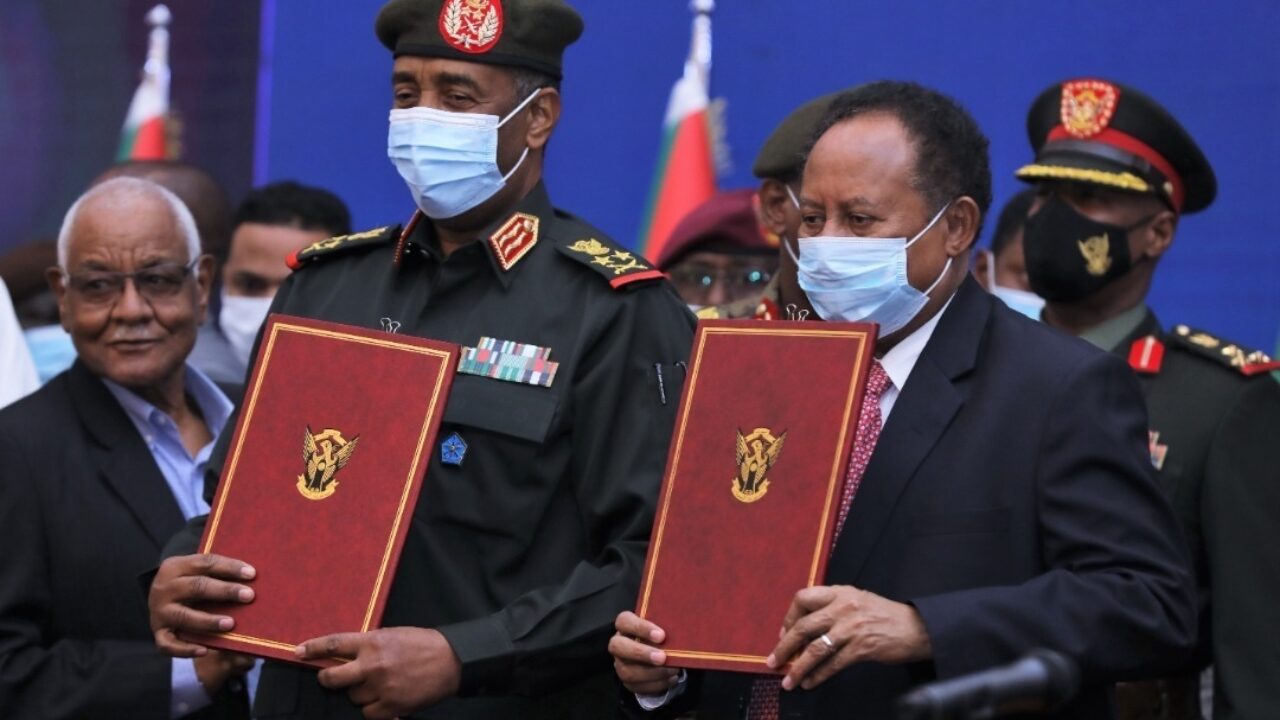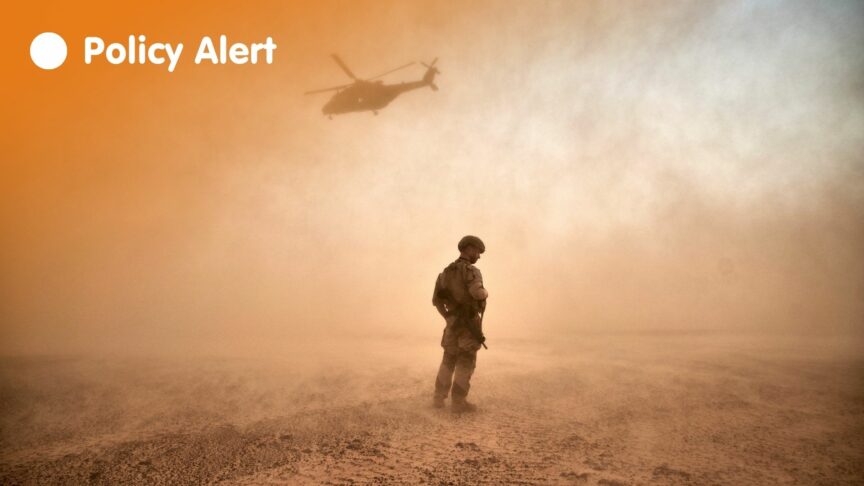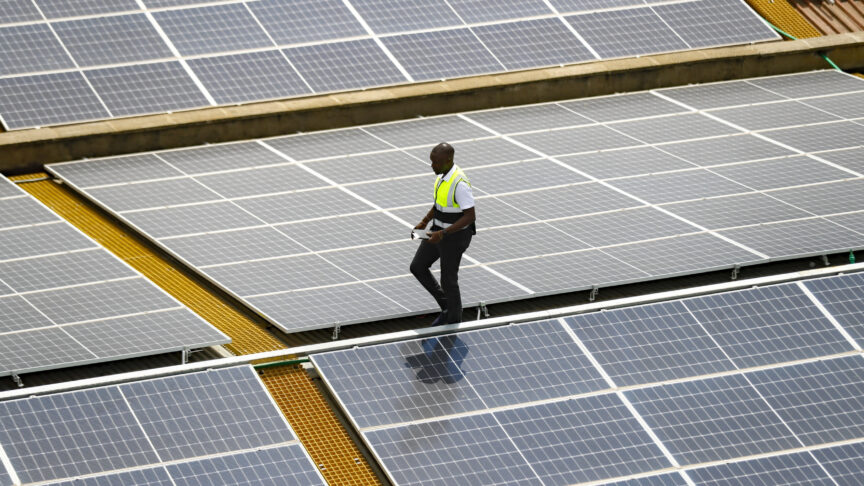Europe’s stance on Sudan: Why backing the prime minister may not equate to backing democracy
Divergences are growing between the demands of Sudan’s powerful protest movement and the approach taken by the international community. Both can offer solutions, but they need to move quickly
At a hastily convened signing ceremony on Sunday morning, Sudan’s prime minister, Abdalla Hamdouk, and General Fatah al Burhan inked a deal to resume the civilian-military partnership at the heart of Sudan’s Transitional Government. Hamdouk’s reinstatement formed the headline of the 14-point deal, entitled simply “Political Agreement”.
Rather than prompting jubilation, the deal generated dismay across a wide swathe of Sudanese society sympathetic to the protest movement. That movement mobilised en masse, leading to the overthrow of President Omar Bashir in 2019, and again took to the streets in rejection of the military’s coup four weeks ago. Now, in reaction to the Political Agreement, the protesters’ message is: the revolution has been betrayed before and prevailed. But what they regard as Hamdouk’s about-face was a particularly painful blow. Over the last month, the movement had elevated him to the avatar of the revolution. The prime minister’s steadfast refusal to go along with the military’s attempts to co-opt him as the coup first unfolded sent his stock with the Sudanese street soaring. Shaken but not deterred, the protesters now vow to continue peaceful resistance, declaring the Political Agreement illegitimate and Hamdouk no longer representative of them.
Following the coup, a divergence began developing between what the international community was calling for and the wishes of the protest movement. The former wanted a return to the civilian-military power sharing agreement. But, driven by a sense of betrayal by the military, the protest movement’s demands escalated. The status quo ante had rested on a minimum of trust that the military would never cross the red line of overthrowing the civilian element of the government. That assurance is now a relic. With the spilled blood of demonstrators now inflaming emotions, the original compromise of a civilian-military partnership, which the protest movement agreed to only reluctantly after it deposed Bashir, appeared to have been naïve and short-sighted. So, while the international community pressed for a return to the constitutional order that has the civilian-military partnership at its heart, the protest movement escalated their demand for full civilian control of the Transitional Government. The protesters read Sunday’s Political Agreement as even less than a return to the former status quo because, rather than reinstate the entire civilian component of the government, it reinstates only Hamdouk. With the Political Agreement under-delivering in the protesters’ eyes, in conjunction with their escalated demands, a yawning gap of expectation has opened up.
Coercion, fatigue, and isolation from outside counsel while under military detention have all been suggested by the protesters as factors influencing Hamdouk’s decision to sign. And the imperative of a responsible leader to prevent further bloodshed through compromise must have sat heavily with him. But this still leaves something to be desired as a full explanation.
Infighting within the political leadership of the civilian component had hamstrung Hamdouk’s leadership for months. It was also cited by the military as justification for the coup – as the only recourse given government gridlock. In this context, two particular elements of the Political Agreement convey the document’s real meaning. Weighing whether the civilian component is diminished misses the point. In fact, the agreement opens the door to fundamentally rebalancing the mix of political forces participating in government. Firstly, by only reinstating Hamdouk, the rest of the civilian government is de facto removed, which creates space for others. Secondly, Point 6 of the Political Agreement describes a process of broadening the transitional government’s political tent going forward and specifically references political forces well beyond the civilians’ liberal, democratic political camp. Thus, in the tradition of all adept politicians, Hamdouk may have seen in the crisis wrought by the coup an opportunity that should not go to waste.
The current situation threatens to contort European policymaking
The risk for both Hamdouk and the transition more broadly is that, in distancing one political camp and opening the door to replace them with another, the way is paved for a return of the former regime rather than establishing a more functional government. Key here would be Sudan’s Islamists, who are often lumped together with the former regime’s political party, the National Congress Party. The protesters fear that while Point 6 of the Political Agreement specifically excludes the former regime from participating in government, the vaguely defined reference to Islamists may act as a trojan horse for allowing them back in. The military’s rapid placement of figures associated with the former regime into government directly after the coup lends credence to this fear.
The prospect of Sudan transitioning to democracy animates the policy of the European Union and its member states. The widespread political mobilisation in favour of democracy forms the heart of that policy. Unique to Sudan, it is the protest movement’s depth, breadth, and staying power that proved it to be a substantial enough political force for Europeans and others to build a position around. When he was appointed, the prime minister formally derived his mandate from being nominated by the coalition of political parties, the Forces for Freedom and Change (FFC). The FFC was roughly aligned with the protest movement at the time the Constitutional Declaration forming the Transitional Government was agreed. With the FFC now out of government and the protest movement turned against him, Hamdouk’s representative mandate comes into question. Should the prime minister no longer represent the protest movement, then Europe’s backing for him does not automatically equate to supporting democracy. Therefore, the current situation threatens to contort European policymaking.
For its part, the protest movement is intent on moving ahead without Hamdouk and opposing the Political Agreement. That will be no easy feat. Success in this regard would require international partners to jump over their shadow twice: replace an imperfect agreement with no agreement, while undermining the highest-ranking civilian member of government, the prime minister. In terms of state-to-state relations, this would be an exceedingly bold move, requiring political clearance high up the diplomatic food chain. To improve its prospects, the protest movement will need to bring readily useable solutions rather than simply point out problems. This would mean credibly demonstrating how the prime minister could be replaced by a candidate that enjoys unified and fulsome support across the competitive, diffuse, and horizontally delineated protest movement and FFC political landscape. The movement will also need to present a plausible alternative to the existing Political Agreement.
International policymakers may assess the Political Agreement as being better than nothing. They may reason away the protest movement’s antipathy towards it as the pangs of painful but necessary compromise for the greater good of averting further bloodshed and putting some form of transition back on track. But if Europe is to maintain this stance, it will have to urgently find ways to square the circle of maintaining fidelity to democracy and healing the split between the prime minister and protest movement. Europeans should bring pressure to bear to wring the maximum out of the military and treat the Political Agreement as a positive start to expand upon, rather than an end in itself. The first step to building confidence in such an approach lies in the other important provisions of the Political Agreement – release of political prisoners, the reworking of the tamkeen deep state financial network elimination committee, and other points. These all need to be realised to the fullest, and quickly. If what happens next proves a failure, then Europe will have acted as handmaiden to the military’s slow despatch of the civilian government
The European Council on Foreign Relations does not take collective positions. ECFR publications only represent the views of their individual authors.



